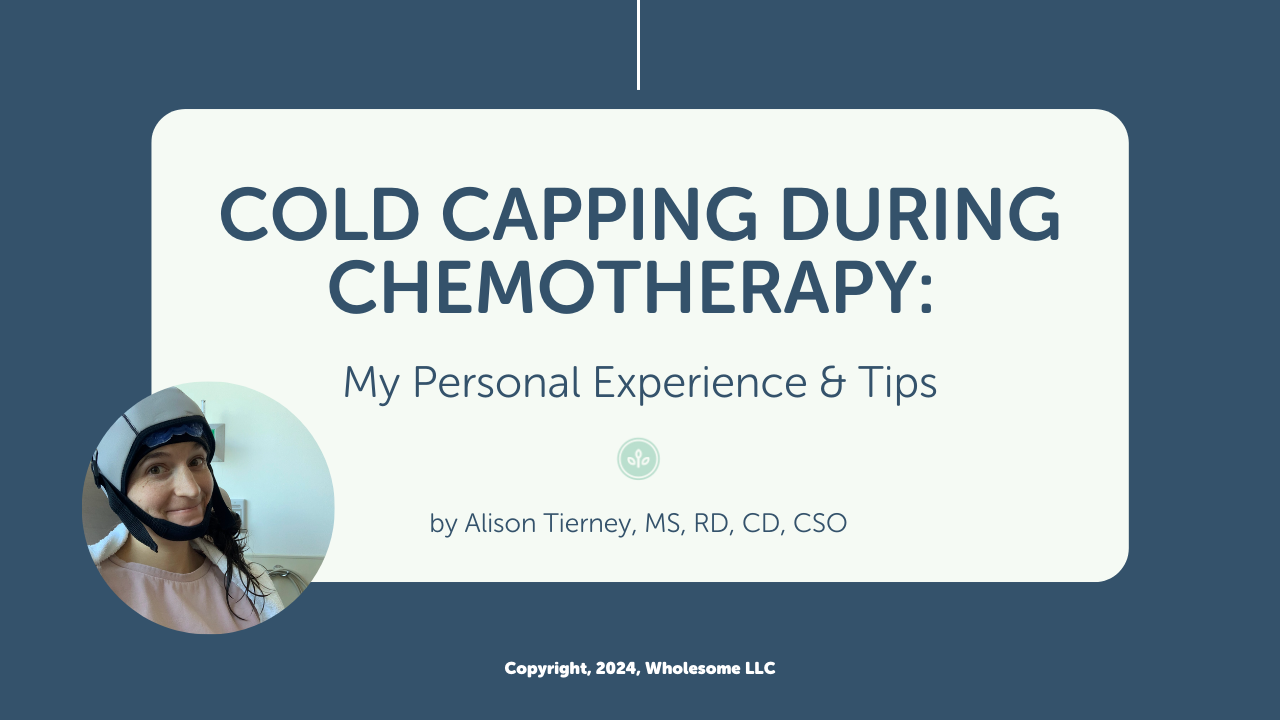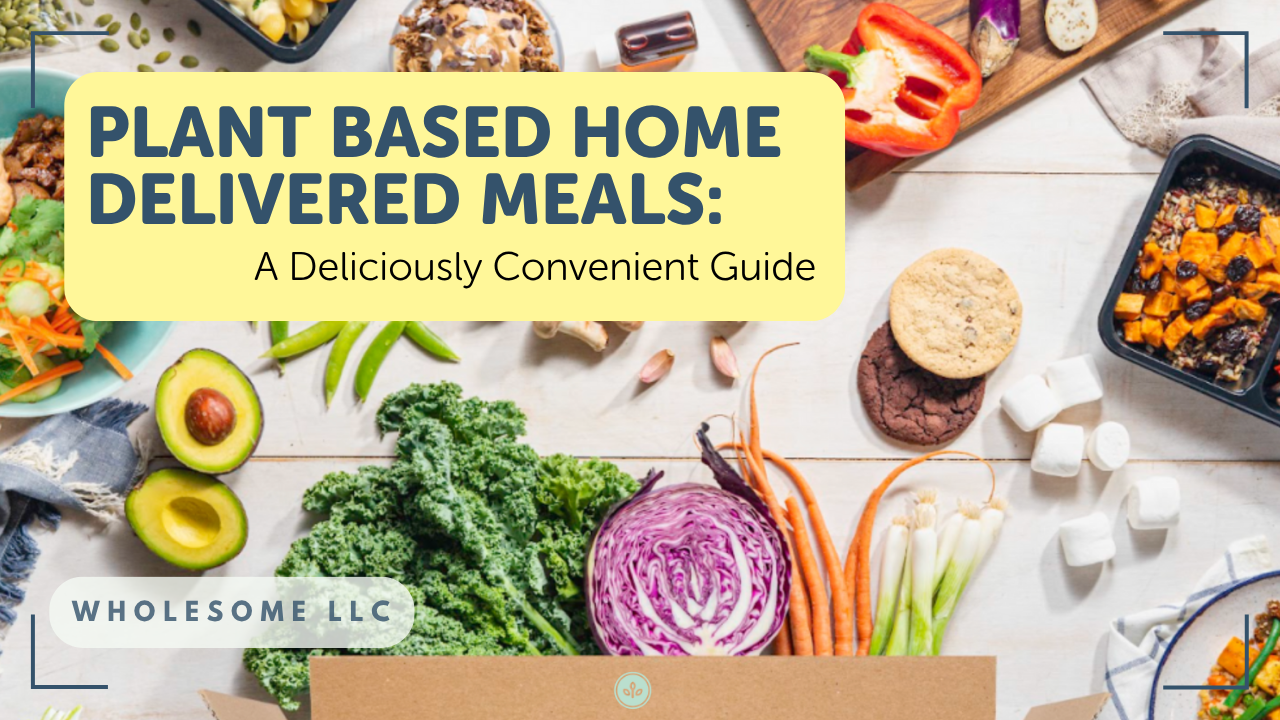The Wholesome Journey - Group Nutrition Coaching Program
Mentorship Program, 1:1 Nutrition Coaching with Alison
What do you want to learn more about?
Program Login
Podcast Features
March 28, 2019
Alison Tierney, MS, RD, CD, CSO
Alison is a registered dietitian, board-certified in oncology nutrition, and a cancer thriver. Her expertise in oncology nutrition and personal experience with her own cancer diagnosis and its treatment provide her with the unique perspective of being able to relate to her clients on an entirely different level. Her content is consistently focused on evidence-based guidelines and seeks to increase the awareness of the power of nutrition to complement traditional cancer therapies.
- Alison Tierney, MS, RD, CD, CSO
- Alison Tierney, MS, RD, CD, CSO
- Alison Tierney, MS, RD, CD, CSO
- Alison Tierney, MS, RD, CD, CSO
- Alison Tierney, MS, RD, CD, CSO
- Alison Tierney, MS, RD, CD, CSO
- Alison Tierney, MS, RD, CD, CSO
- Alison Tierney, MS, RD, CD, CSO
- Alison Tierney, MS, RD, CD, CSO
- Alison Tierney, MS, RD, CD, CSO
- Alison Tierney, MS, RD, CD, CSO
- Alison Tierney, MS, RD, CD, CSO
- Alison Tierney, MS, RD, CD, CSO
- Alison Tierney, MS, RD, CD, CSO
- Alison Tierney, MS, RD, CD, CSO
- Alison Tierney, MS, RD, CD, CSO
- Alison Tierney, MS, RD, CD, CSO
- Alison Tierney, MS, RD, CD, CSO
- Alison Tierney, MS, RD, CD, CSO
- Alison Tierney, MS, RD, CD, CSO
- Alison Tierney, MS, RD, CD, CSO
- Alison Tierney, MS, RD, CD, CSO
- Alison Tierney, MS, RD, CD, CSO
- Alison Tierney, MS, RD, CD, CSO
- Alison Tierney, MS, RD, CD, CSO
- Alison Tierney, MS, RD, CD, CSO
- Alison Tierney, MS, RD, CD, CSO
- Alison Tierney, MS, RD, CD, CSO
- Alison Tierney, MS, RD, CD, CSO
- Alison Tierney, MS, RD, CD, CSO
- Alison Tierney, MS, RD, CD, CSO
- Alison Tierney, MS, RD, CD, CSO
- Alison Tierney, MS, RD, CD, CSO
- Alison Tierney, MS, RD, CD, CSO
- Alison Tierney, MS, RD, CD, CSO
- Alison Tierney, MS, RD, CD, CSO
- Alison Tierney, MS, RD, CD, CSO
- Alison Tierney, MS, RD, CD, CSO
- Alison Tierney, MS, RD, CD, CSO
- Alison Tierney, MS, RD, CD, CSO
- Alison Tierney, MS, RD, CD, CSO
- Alison Tierney, MS, RD, CD, CSO
- Alison Tierney, MS, RD, CD, CSO
- Alison Tierney, MS, RD, CD, CSO
- Alison Tierney, MS, RD, CD, CSO
- Alison Tierney, MS, RD, CD, CSO
- Alison Tierney, MS, RD, CD, CSO
- Alison Tierney, MS, RD, CD, CSO
- Alison Tierney, MS, RD, CD, CSO
- Alison Tierney, MS, RD, CD, CSO
- Alison Tierney, MS, RD, CD, CSO
- Alison Tierney, MS, RD, CD, CSO
- Alison Tierney, MS, RD, CD, CSO
- Alison Tierney, MS, RD, CD, CSO
- Alison Tierney, MS, RD, CD, CSO
- Alison Tierney, MS, RD, CD, CSO
- Alison Tierney, MS, RD, CD, CSO
- Alison Tierney, MS, RD, CD, CSO
- Alison Tierney, MS, RD, CD, CSO
- Alison Tierney, MS, RD, CD, CSO
- Alison Tierney, MS, RD, CD, CSO
- Alison Tierney, MS, RD, CD, CSO
- Alison Tierney, MS, RD, CD, CSO
- Alison Tierney, MS, RD, CD, CSO
- Alison Tierney, MS, RD, CD, CSO
- Alison Tierney, MS, RD, CD, CSO
- Alison Tierney, MS, RD, CD, CSO
- Alison Tierney, MS, RD, CD, CSO
- Alison Tierney, MS, RD, CD, CSO
- Alison Tierney, MS, RD, CD, CSO
- Alison Tierney, MS, RD, CD, CSO
- Alison Tierney, MS, RD, CD, CSO
- Alison Tierney, MS, RD, CD, CSO
- Alison Tierney, MS, RD, CD, CSO
- Alison Tierney, MS, RD, CD, CSO
- Alison Tierney, MS, RD, CD, CSO
- Alison Tierney, MS, RD, CD, CSO
- Alison Tierney, MS, RD, CD, CSO
- Alison Tierney, MS, RD, CD, CSO
- Alison Tierney, MS, RD, CD, CSO
- Alison Tierney, MS, RD, CD, CSO
- Alison Tierney, MS, RD, CD, CSO
- Alison Tierney, MS, RD, CD, CSO
- Alison Tierney, MS, RD, CD, CSO
- Alison Tierney, MS, RD, CD, CSO
- Alison Tierney, MS, RD, CD, CSO
- Alison Tierney, MS, RD, CD, CSO
- Alison Tierney, MS, RD, CD, CSO
- Alison Tierney, MS, RD, CD, CSO
- Alison Tierney, MS, RD, CD, CSO
- Alison Tierney, MS, RD, CD, CSO
- Alison Tierney, MS, RD, CD, CSO
- Alison Tierney, MS, RD, CD, CSO
- Alison Tierney, MS, RD, CD, CSO
- Alison Tierney, MS, RD, CD, CSO
- Alison Tierney, MS, RD, CD, CSO
- Alison Tierney, MS, RD, CD, CSO
- Alison Tierney, MS, RD, CD, CSO
- Alison Tierney, MS, RD, CD, CSO
- Alison Tierney, MS, RD, CD, CSO
- Alison Tierney, MS, RD, CD, CSO
- Alison Tierney, MS, RD, CD, CSO
- Alison Tierney, MS, RD, CD, CSO
- Alison Tierney, MS, RD, CD, CSO
- Alison Tierney, MS, RD, CD, CSO
- Alison Tierney, MS, RD, CD, CSO
- Alison Tierney, MS, RD, CD, CSO
- Alison Tierney, MS, RD, CD, CSO
- Alison Tierney, MS, RD, CD, CSO
- Alison Tierney, MS, RD, CD, CSO
- Alison Tierney, MS, RD, CD, CSO
- Alison Tierney, MS, RD, CD, CSO
- Alison Tierney, MS, RD, CD, CSO
- Alison Tierney, MS, RD, CD, CSO
- Alison Tierney, MS, RD, CD, CSO
- Alison Tierney, MS, RD, CD, CSO
- Alison Tierney, MS, RD, CD, CSO
- Alison Tierney, MS, RD, CD, CSO
- Alison Tierney, MS, RD, CD, CSO
- Alison Tierney, MS, RD, CD, CSO
- Alison Tierney, MS, RD, CD, CSO
- Alison Tierney, MS, RD, CD, CSO
- Alison Tierney, MS, RD, CD, CSO
All too often, high-protein and low-carbohydrate diets are recommended to my cancer patients by their health care practitioners.
Neither of these recommendations, which are often one in the same, should be recommended for an individual with a cancer diagnosis (with a rare exception).
High-protein diets may actually lead to the progression of cancer. In fact, it increases cancer death by 4x! (1)
Aside from cancer, high-protein intake is linked to osteoporosis, heart disease, hypertension, obesity, accelerated aging, and diabetes, with a 75% increase in overall mortality (or, death). (1)
Research has found a few plausible explanations. One of them being high-protein diets, specifically high in animal proteins, increases a growth hormone known as IGF-1 in our bodies (or, insulin-like growth factor 1).
Let me explain.
IGF-1 is natural and necessary for human development. From birth to our adolescent years, we have higher levels of IGF-1 to help us grow.
So, how much do we want to grow as adults?
Not all that much. We want enough growth for our healthy cells like skin, hair, and GI (gastrointestinal) cells to turnover. Unfortunately, when IGF-1 is overexpressed (we have too much in our bodies) we encounter a problem because IGF-1 is a cancer promoting growth hormone. It is produced in excess by our liver when animal protein is consumed–meat, poultry, fish, dairy, and eggs. (2)
Before I go further, it is important to know a normal human cell has some IGF-1 receptors. There are several types of cell receptors. But let’s just focus on an IGF-1 receptor for the moment.
Let’s simplify a complicated process.

Review the image above. On the normal cell, you can see a few IGF-1 receptors on the surface of the cell. When the IGF-1 hormone attaches to these receptors, cell growth is possible.
Now, take a look at the cancer cell. You’ll notice an increased number of IGF-1 receptors. Research has identified most cancer tumors have increased IGF-1 receptors on its surface, just like this image. When this happens, even more IGF-1 (the hormone) binds to the cell leading to overexpression of IGF-1, or accelerated growth of the cell. As a result, the development or progression of cancerous tumors is possible. (3)
On the other hand, research indicates IGF-1 levels are 13% lower in vegan women and 9% lower in vegan men compared to meat eating and vegetarian eaters. (4)
What’s the good news in all of this?
When individuals switched to a plant-based diet, IGF-1 levels were significantly reduced in just 11 days. (5) This is because the associations of disease and death in high-protein diets are eliminated when the protein is plant-derived. (6)

And in one of the most impressive studies on nutrition and cancer by Dr. Dean Ornish, it was found that a plant-based diet was able to reverse the progression of early stage prostate cancer without surgery, chemotherapy, or radiation. (7)
How COOL is that?! #nutritionwin
Although high-protein, low-carbohydrate diets may lead to quick weight loss, at least in the short-term, it shouldn’t be recommended due to its negative long-term effects on health.
So, what should you take away from this?
Protein is a necessary nutrient for our health. It has many responsibilities. But the overconsumption of animal-protein should be avoided.
Not sure which plant-based foods contain significant amounts of protein? Don’t worry, we covered that in our, “But, where do you get your protein?” post.
Not sure how much protein you need per day? I reviewed a quick way to estimate your protein needs in our Facebook Live.
What other questions do you have about protein and cancer?
References
- M E Levine, J A Suarez, S Brandhorst, P Balasubramanian, C W Cheng, F Madia, L Fontana, M G Mirisola, J Guevara-Aguirre, J Wan, G Passarino, B K Kennedy, M Wei, P Cohen, E M Crimmins, V D Longo.Low protein intake is associated with a major reduction in IGF-1, cancer, and overall mortality in the 65 and younger but not older population. Cell Metab. 2014 Mar 4;19(3):407-17.
- Greger, M., MD, FACLM (Writer). (2016, August 22). Animal Protein Compared to Cigarette Smoking [Video file]. Retrieved March 27, 2019, from https://nutritionfacts.org/video/animal-protein-compared-cigarette-smoking/
- R Steuerman, O Shevah, Z Laron. Congenital IGF1 deficiency tends to confer protection against post-natal development of malignancies. Eur J Endocrinol. 2011 Apr;164(4):485-9.
- N E Allen, P N Appleby, G K Davey, R Kaaks, S Rinaldi, T J Key. The associations of diet with serum insulin-like growth factor I and its main binding proteins in 292 women meat-eaters, vegetarians, and vegans. Cancer Epidemiol Biomarkers Prev. 2002 Nov;11(11):1441-8.
- T H Ngo, R J Barnard, C N Tymchuk, P Cohen, W J Aronson. Effect of diet and exercise on serum insulin, IGF-I, and IGFBP-1 levels and growth of LNCaP cells in vitro (United States). Cancer Causes Control. 2002 Dec;13(10):929-35.
- T T Fung, R M van Dam, S E Hankinson, M Stampfer, W C Willett, F B Hu. Low-carbohydrate diets and all-cause and cause-specific mortality: two cohort studies. Ann Intern Med. 2010 Sep 7;153(5):289-98.
- D Ornish, G Weidner, W R Fair, R Marlin, E B Pettengill, C J Raisin, S Dunn-Emke, L Crutchfield, F N Jacobs, R J Barnard, W J Aronson, P McCormac, D J McKnight, J D Fein, A M Dnistrian, J Weinstein, T H Ngo, N R Mendell, P R Carroll. Intensive lifestyle changes may affect the progression of prostate cancer. J Urol. 2005 Sep;174(3):1065-9; discussion 1069-70.

High Protein Diets and Cancer Risk
Leave a Reply Cancel reply
Featured Articles
Wholesome LLC is not a medical practice, and its employees cannot offer medical advice. This website provides educational information but it is not a substitute for medical advice from a licensed medical professional who is familiar with your particular facts and circumstances. The information contained on this website is not intended to diagnose, treat, or cure any disease and shall not be construed as medical advice. The information and education on this website is provided for you to use at your own discretion.
You can further review our disclaimer here.
Wholesome
About Alison
Courses & Programs
The Wholesome Journey
Free Resources
FAQs
Press & Media
Recipes
Blog
Contact Us
Shop
© 2026 Wholesome, LLC All rights reserved.
Privacy Policy
Terms of Use
Disclaimer
Mobile Terms of Service



Be the first to comment